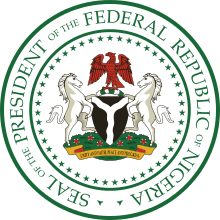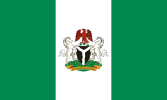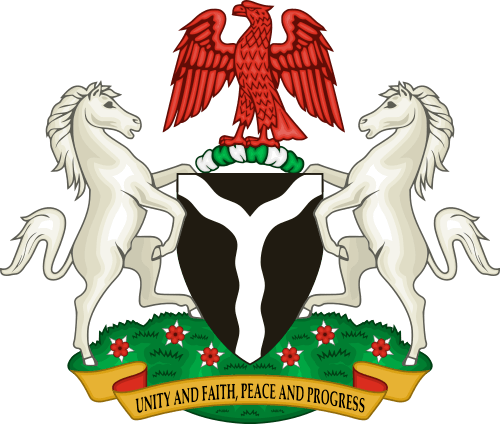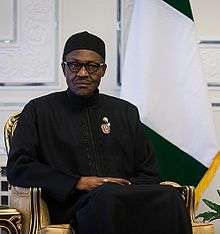President of Nigeria
| President of the Federal Republic of Nigeria | |
|---|---|
 | |
 | |
| Executive Branch of the federal government | |
| Style |
Mr. President His Excellency |
| Member of |
Federal Executive Council National Security Council |
| Residence | Aso Rock Presidential Villa |
| Seat | Abuja, F.C.T. |
| Appointer | Direct popular election |
| Term length |
Four years renewable once |
| Constituting instrument | Constitution of Nigeria |
| Formation | October 1, 1963 |
| First holder |
Nnamdi Azikiwe October 1, 1963 |
| Deputy | Vice President of Nigeria |
| Salary | ₦14,000,000 ($70,351) annually[1] |
| Website |
www |
.svg.png)
.svg.png)
 |
|---|
| This article is part of a series on the politics and government of Nigeria |
|
Judiciary |
|
The President of the Federal Republic of Nigeria is the head of state and head of the national executive of Nigeria. The President of Nigeria is also the commander-in-chief of the Nigerian Armed Forces. The President is elected in national elections which take place every four years. The first President of Nigeria was Nnamdi Azikiwe, who took office on October 1, 1963. The current President, Muhammadu Buhari took office on May 29, 2015 as the 15th President of the Federal Republic of Nigeria.
History
On October 1, 1960, Nigeria gained independence from Britain. An all-Nigerian Executive Council was headed by a Prime Minister, Alhaji Sir Abubakar Tafawa Balewa. On November 16, 1960, Dr. Nnamdi Azikiwe, became the first Governor-General of a Federation of three Regions of the North, East and West, with Lagos as the Federal Capital. Each of the Regions was headed by a Premier with a Governor as Ceremonial Head. On October 1, 1963, Nigeria became a Federal Republic and severed whatever ties were left with the British monarchy, but remained a member in the Commonwealth of Nations. The Governor-General's position was, therefore, replaced with that of President.
In January 1966, a group of army officers, led by Major Chukwuma Nzeogwu, overthrew the central and regional governments, killed the prime minister, and tried to take control of the government in a failed coup d'état. Nzeogwu was countered, captured and imprisoned by General Johnson Aguiyi-Ironsi. General Aguiyi-Ironsi was named Military Head of State.
In July 1966, a group of northern army officers revolted against the government, killed General Johnson Aguiyi-Ironsi, and appointed the army chief of staff, General Yakubu Gowon as the head of the new military government.
In 1975, General Yakubu Gowon was deposed and General Murtala Mohammed was the Head of the Federal Military Government of Nigeria until his assassination in 1976.
In 1976, General Olusegun Obasanjo was made head of state in a meeting of the Supreme Military Council, keeping the chain of command established by Murtala Muhammed in place.
In 1979, Nigeria adopted a federal presidential constitution, with provision for an executive President as head of government, and a National Assembly, comprising a Senate and House of Representatives.
In October 1979, after more than 13 years of military rule, Nigeria returned to democratic rule. The National Party of Nigeria emerged victorious in the presidential election and Alhaji Shehu Shagari was elected President.
On December 31, 1983, the military overthrew the Second Republic. Major General Muhammadu Buhari emerged as the Chairman of the Supreme Military Council (SMC), the new Head of State.
In August 1985, General Buhari's government was peacefully overthrown by Army Chief of Staff, Major General Ibrahim Babangida. Babangida became the President and Chairman of the Armed Forces Ruling Council.
In August 1993, General Babangida stepped down and chose an interim government to replace him. Ernest Shonekan was named as interim president. General Sani Abacha seized power from Shonekan in November 1993 and became the President and Chairman of the Provisional Ruling Council.
On 8 June 1998, General Abacha died at the presidential villa in the Nigerian capital, Abuja. Major General Abdulsalami Abubakar became the new President and Chairman of the Provisional Ruling Council.
In May 1999, Major General Abdulsalami Abubakar stepped down, and the former military head of state, Olusegun Obasanjo, became the newly elected civilian president. Obasanjo served two terms in office.
In May 2007, Alhaji Umaru Yar'Adua was sworn in as President of the Federal Republic of Nigeria, the 13th head of state of Nigeria. Yar'Adua died on 5 May 2010 in the Presidential villa, in Abuja, Nigeria.
On 6 May 2010, the Vice President Goodluck Jonathan was sworn in as President of the Federal Republic of Nigeria and the 14th head of state.
On 29 May 2015, Muhammadu Buhari was sworn in as President of the Federal Republic of Nigeria and the 15th head of state after winning the general election.
Functions of the President of Nigeria
The President has the powers entrusted by the Constitution and legislation, including those necessary to perform the functions of Head of State and Head of the national executive.
The President is responsible for:
- Assenting to and signing Bills
- Referring a Bill back to the National Assembly for reconsideration of the Bill's constitutionality
- Referring a Bill to the Supreme Court for a decision on the Bill's constitutionality
- Summoning the National Assembly or Parliament to an extraordinary sitting to conduct special business
- Making any appointments that the Constitution or legislation requires the President to make, other than as head of the national executive
- Appointing commissions of inquiry
- Appointing the Supreme Court Justices of Nigeria on the recommendation of the National Judicial Council of Nigeria and subject to confirmation by the Senate
- Calling a national referendum in terms of an Act of Parliament
- Receiving and recognising foreign diplomatic and consular representatives
- Appointing ambassadors, plenipotentiaries, and diplomatic and consular representatives and other federal officers with the advice and consent of a majority of the Senate
- Pardoning or reprieving offenders and remitting any fines, penalties or forfeitures
- Conferring honours
Eligibility
Chapter VI, Part I, Section 131 of the constitution states that a person may be qualified for election of the office of the President if:
- he is a citizen of Nigeria by birth;
- he has attained the age of thirty five years;
- he is a member of a political party and is sponsored by that political party;
- he has been educated up to at least School Certificate level or its equivalent.
A person who meets the above qualifications is still disqualified from holding the office of the President if:
- he has voluntarily acquired the citizenship of a country other than Nigeria or, except in such cases as may be prescribed by the National Assembly, he has made a declaration of allegiance to such other country;
- he has been elected to such office at any two previous elections;
- under the law in any part of Nigeria, he is adjudged to be a lunatic or otherwise declared to be of unsound mind;
- he is under a sentence of death imposed by any competent court of law or tribunal in Nigeria or a sentence of imprisonment or fine for any offence involving dishonesty or fraud or for any other offence, imposed on him by any court or tribunal or substituted by a competent authority for any other sentence imposed on him by such a court of tribunal;
- within a period of less than ten years before the date of the election to the office of President he has been convicted and sentenced for an offence involving dishonesty or he has been found guilty of the contravention of the Code of Conduct;
- he is an undischarged bankrupt, having been adjudged or otherwise declared bankrupt under any law in force in Nigeria or any other country;
- being a person employed in the civil or public service of the Federation or of any State, he has not resigned, withdrawn or retired from the employment at least thirty days before the date of the election; or
- he is a member of any secret society;
- he has been indicted for embezzlement or fraud by a Judicial Commission of Inquiry or an Administrative Panel of Inquiry or a Tribunal set up under the Tribunals of Inquiry Act, a Tribunals of Inquiry law or any other law by the federal or state government which indictment has been accepted by the federal or state government respectively;
- he has presented a forged certificate to the Independent National Electoral Commission.
Oath of office
The Constitution of Nigeria specifies an oath of office for the President of the federation. The oath is administered by the Chief Justice of the Supreme Court of Nigeria or the person for the time being appointed to exercise the functions of that office:
I do solemnly swear/affirm that I will be faithful and bear true allegiance to the Federal Republic of Nigeria; that as President of the Federal Republic of Nigeria, I will discharge my duties to the best of my ability, faithfully and in accordance with the Constitution of the Federal Republic of Nigeria and the law, and always in the interest of the sovereignty, integrity, solidarity, well-being and prosperity of the Federal Republic of Nigeria; that I will strive to preserve the Fundamental Objectives and Directive Principles of State Policy contained in the Constitution of the Federal Republic of Nigeria; that I will not allow my personal interest to influence my official conduct or my official decisions; that I will to the best of my ability preserve, protect and defend the Constitution of the Federal Republic of Nigeria; that I will abide by the Code of Conduct contained in the Fifth Schedule to the Constitution of the Federal Republic of Nigeria; that in all circumstances, I will do right to all manner of people, according to law, without fear or favour, affection or ill-will; that I will not directly or indirectly communicate or reveal to any person any matter which shall be brought under my consideration or shall become known to me as President of the Federal Republic of Nigeria, except as may be required for the due discharge of my duties as President; and that I will devote myself to the service and well-being of the people of Nigeria. So help me God.
See also
References
- ↑ Ibeh, Nnenna (30 May 2015). "Buhari to earn N14 million as annual salary, allowances". Premium Times. Retrieved 30 May 2015.
